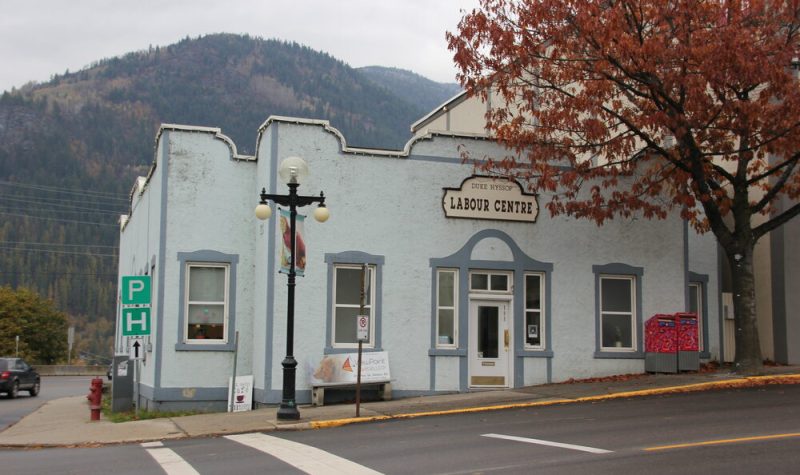When the Nelson Fentanyl Task Force’s educational conference was cancelled because of the pandemic this year, funds were instead given to a support outreach worker in Nelson.
"We're really happy that we were able to use this funding to support direct health services, outreach services for people in town," said Amanda Erickson, the regional community action team coordinator with the Nelson Fentanyl Task Force (NFTF).
With approval from the provincial Overdose Emergency Response Centre, the Ministry of Mental Health and Addictions, and Community Action Initiative, the NFTF was allowed to invest the $15,000 directly into the community.
Last year, the conference hosted 130 people working in healthcare, first response and community care to speak and learn about reducing the stigma people who use substances face. But with the pandemic, hosting a group of that size became its own health hazard.
A recent report from the BC Coroners Service revealed more British Columbians are dying by overdose than ever before. By the end of August, 1,068 people in B.C. died as a result of overdose — more than the total overdose fatalities in the province in 2019. Before the pandemic, overdose prevention sites, more use of naloxone, drug checking responses and opioid agonist therapy were all credited with helping to reduce overdose death rates. But some response organizations were forced to close their doors, or reduce services, when the pandemic reached Canada.
During the pandemic, the province of B.C. has produced the Risk Mitigation document to address facing two public health crises at once. In the new directives, it includes increasing the options doctors and nurses can offer to substance use patients in an effort to reduce the use of an illegal drug supply contaminated with fentanyl.
“All doctors and nurses now have the ability to prescribe, according to this document, but not many are yet. So Nelson’s actually one of the only places around where this is happening right now,” Erickson said. “What these options do, they also allow people to remain in social isolation to reduce the risk of COVID, both for themselves and for everyone in the community.”
In Nelson, local supports have, for the most part, reopened. The support worker at ANKORS, who is receiving the funds from the NFTF, will join them. The outreach worker will be forming relationships with people, encouraging them to continue using low-barrier healthcare services.
“And there's been some great success, in terms of stabilizing people enough and reducing their risk of overdose, so that they've been able to remain housed,” Erickson said.
“This direct support is what's needed right now, at this time. Everyone's working as hard as they can to address these dual concerns, with the overdose crisis and now with the COVID-19 pandemic," she added. "The overdose crisis has really ramped up ever since COVID hit, so that's what we're really focused on is trying to reduce deaths due to overdose in our region.”
Erickson said the Kootenay region has been hit hard by the opioid overdose crisis. Grand Forks, she said, has the highest overdose rate of a small town in B.C.
“We're definitely not immune from the overdose crisis,” she added.
Erickson said this work is quite cutting edge and Nelson is lucky to have such supports.
Zak Matieschyn is a family nurse practitioner in Nelson. He has 12 years of experience in the West Kootenay and, in the last year, he has helped comment for the Ministry of Health.
In the past few decades, Matieschyn said the province and healthcare workers have tried many methods to reduce people’s use of a risky drug supply. Despite maximal enforcement, the judicial system, education, treatment, and prevention campaigns, more people than ever are dying of overdoses in B.C.
“All of these campaigns are important, but we haven't stopped people from using the substances for a variety of reasons. As they continue to use them, and as the supply has gotten progressively more toxic, we need to look at new and innovative ideas. And an idea that has been in the works for quite some years is this idea of a regulated drug supply,” he said.
Matieschyn said he is moving forward cautiously with the new guidelines.
“This is provocative and innovative. I think that the authors of the Risk Mitigation guidelines that sort of inform this idea did so in a rushed way, much in response to the COVID pandemic,” he said.
With the help of the outreach worker in Nelson, Matieschyn said the amount of follow-up, assessment and monitoring necessary to care for patients on a prescribed drug supply will be possible.
“It would be impossible to do this aspect of care without that position,” he said.
“I hope that in the future as we develop more robust policy, and we collect further data and evidence, that we can demonstrate this as a viable approach. And that the rollout will increase as more prescribers consider this,” he added.
Erickson encourages people who use substances, or find themselves increasing their use of substances, to talk to their doctor or a trusted loved one.
“Right now, we're really seeing extreme fentanyl concentrations in all sorts of drugs across the board. It's a pretty risky time. With the isolation of the pandemic, we really have to reach out on all fronts and try to support each other,” she added.
People in need of help can contact Rise BC Wellness Centre at 352-5259 or call ANKORS at 505-5506.


